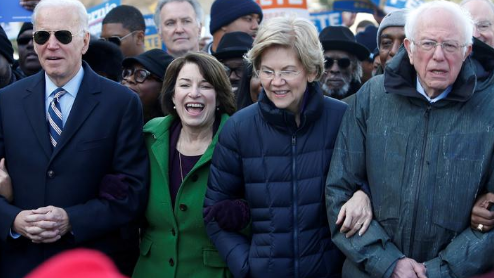Iowa Democrats began meeting at caucus sites around the state on Monday, kicking off what could be a bruising months-long national nominating fight to choose a November election challenger to Republican U.S. President Donald Trump.
Voters poured into more than 1,600 schools, community centers and other public locations to render judgment on a field of 11 Democratic contenders led by front-runners Senator Bernie Sanders of Vermont and former Vice President Joe Biden, who have battled for the top in recent Iowa opinion polls.
Long lines and heavy crowds were reported in some locations, but doors to the caucus sites were supposed to close at 7 p.m. CST (0100 GMT on Tuesday), and results are expected to begin rolling in within an hour or two.
Mostly white, rural Iowa is the first test in the state-by-state battle to pick a Democratic nominee to face Trump in the November 3 election. After more than a year of campaigning and more than $800 million in spending, the results in Iowa could begin to provide answers for a party desperately trying to figure out how to beat the businessman-turned-president.
Do voters want someone with appeal to centrists, independents and disaffected Republicans, like moderates Biden, Pete Buttigieg, the former mayor of South Bend, Indiana, and Senator Amy Klobuchar of neighboring Minnesota? Or should the party choose a candidate who energizes its liberal base and could bring out new voters, like progressives Sanders and fellow Senator Elizabeth Warren of Massachusetts?
The race has been overshadowed in recent weeks, with Sanders, Warren and Klobuchar relegated to part-time campaigning in Iowa as they were forced to remain in Washington for the Senate impeachment trial of Trump. They heard closing arguments on Monday, just hours before the caucuses.
At the caucus sites, voters gather in groups by candidate preference in a public display of support. If a candidate does not reach a threshold of support of 15% of voters in a caucus needed to be considered viable, that candidates’ supporters are released to back another contender, leading to another round of persuasion.
Even if one candidate wins by a commanding margin in Iowa, Democrats may still lack clear answers as the race moves on to the other three early-voting states of New Hampshire, Nevada and South Carolina later in February.
Whoever remains in the race by Super Tuesday, when 15 states and territories vote on March 3, will also confront billionaire former New York Mayor Michael Bloomberg, who is skipping the early states in favor of focusing on states rich in delegates to the Democratic National Convention in July.
Sanders, who finished in a virtual dead heat with Hillary Clinton in Iowa during his first presidential run in 2016, surged recently in many Iowa opinion polls to move just ahead of Biden.
Warren and Buttigieg remain within striking distance, and many polls show a big bloc of undecided Iowa voters, creating the potential for upsets and late surges.
RECORD TURNOUT
Iowa state party officials are expecting a record turnout, exceeding the nearly 240,000 voters who attended the caucuses in 2008 amid the excitement over Barack Obama’s first presidential candidacy.
During final rallies across the state, all the contenders made their cases for why they would be the best choice to beat Trump.
Biden touted his experience after decades in elected office, most notably a track record of achieving progressive goals through bipartisan relationships with lawmakers.
“He is scared to death to run against me, and he has good reason to be concerned,” Biden said of Trump during a rally in Muscatine, Iowa. Accompanied by his wife Jill, Biden greeted supporters and said he was “feeling good” as he delivered pizza to volunteers at a field office in Des Moines on Monday.
Sanders has shrugged off a barrage of attacks from rivals who warn the self-identified democratic socialist would doom the party to defeat against Trump, pointing to polls that show him beating the president.
Warren, who has been slipping in polls, portrayed herself as the candidate who could bring the party together. She also made explicit appeals to women voters.
Buttigieg promised to usher in a new era of optimism in politics and cast himself as an outsider who has not taken part in Washington’s gridlock and is attracting bipartisan support.
“We’re seeing folks come out of the woodwork. Not just diehard Democrats, but some more independent-minded folks, disaffected Republicans looking for a change, wanting to turn the page,” Buttigieg told Fox News Channel on Monday.
Minnesota’s Klobuchar may have the most to lose in neighboring Iowa, where she has spent most of her campaign time and resources, but said she could win conservative areas that Trump captured in 2016.
Republicans were also to hold Iowa caucuses on Monday but Trump, who has around 90 percent support in his party, faces very little threat from two challengers.






